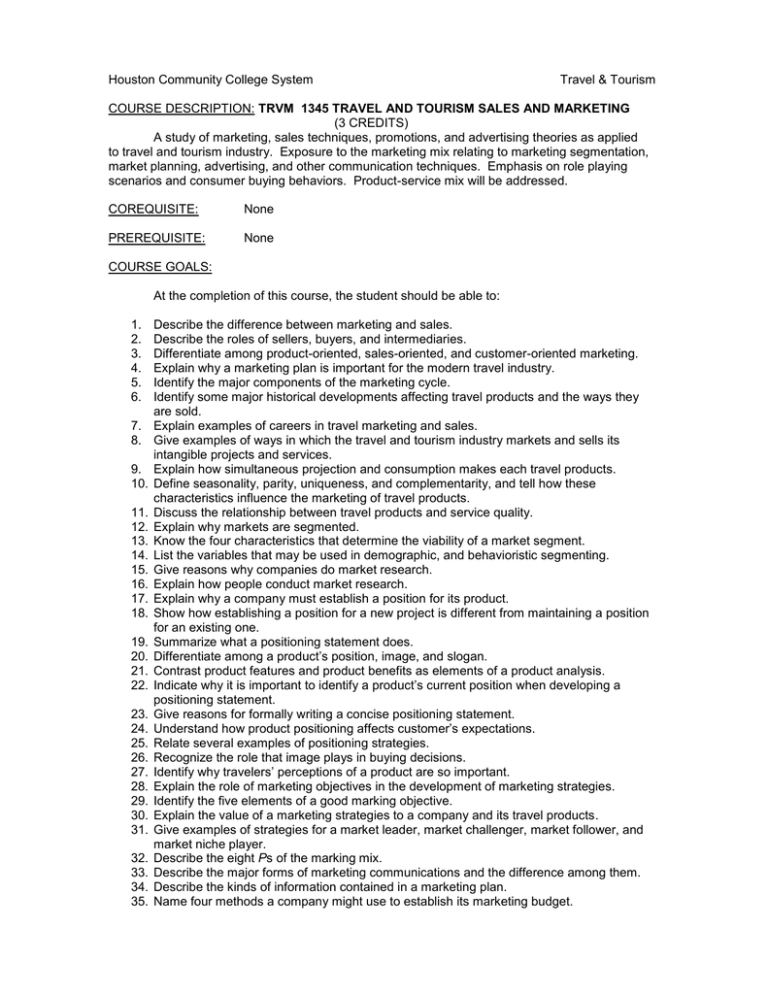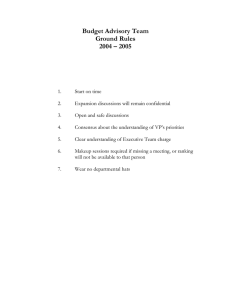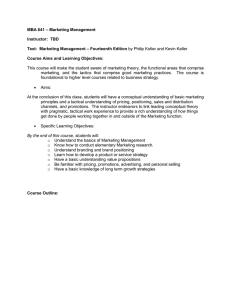1345Mkting.doc
advertisement

Houston Community College System Travel & Tourism COURSE DESCRIPTION: TRVM 1345 TRAVEL AND TOURISM SALES AND MARKETING (3 CREDITS) A study of marketing, sales techniques, promotions, and advertising theories as applied to travel and tourism industry. Exposure to the marketing mix relating to marketing segmentation, market planning, advertising, and other communication techniques. Emphasis on role playing scenarios and consumer buying behaviors. Product-service mix will be addressed. COREQUISITE: None PREREQUISITE: None COURSE GOALS: At the completion of this course, the student should be able to: 1. 2. 3. 4. 5. 6. 7. 8. 9. 10. 11. 12. 13. 14. 15. 16. 17. 18. 19. 20. 21. 22. 23. 24. 25. 26. 27. 28. 29. 30. 31. 32. 33. 34. 35. Describe the difference between marketing and sales. Describe the roles of sellers, buyers, and intermediaries. Differentiate among product-oriented, sales-oriented, and customer-oriented marketing. Explain why a marketing plan is important for the modern travel industry. Identify the major components of the marketing cycle. Identify some major historical developments affecting travel products and the ways they are sold. Explain examples of careers in travel marketing and sales. Give examples of ways in which the travel and tourism industry markets and sells its intangible projects and services. Explain how simultaneous projection and consumption makes each travel products. Define seasonality, parity, uniqueness, and complementarity, and tell how these characteristics influence the marketing of travel products. Discuss the relationship between travel products and service quality. Explain why markets are segmented. Know the four characteristics that determine the viability of a market segment. List the variables that may be used in demographic, and behavioristic segmenting. Give reasons why companies do market research. Explain how people conduct market research. Explain why a company must establish a position for its product. Show how establishing a position for a new project is different from maintaining a position for an existing one. Summarize what a positioning statement does. Differentiate among a product’s position, image, and slogan. Contrast product features and product benefits as elements of a product analysis. Indicate why it is important to identify a product’s current position when developing a positioning statement. Give reasons for formally writing a concise positioning statement. Understand how product positioning affects customer’s expectations. Relate several examples of positioning strategies. Recognize the role that image plays in buying decisions. Identify why travelers’ perceptions of a product are so important. Explain the role of marketing objectives in the development of marketing strategies. Identify the five elements of a good marking objective. Explain the value of a marketing strategies to a company and its travel products. Give examples of strategies for a market leader, market challenger, market follower, and market niche player. Describe the eight Ps of the marking mix. Describe the major forms of marketing communications and the difference among them. Describe the kinds of information contained in a marketing plan. Name four methods a company might use to establish its marketing budget. 36. Describe the responsibilities of marketing professionals during the control phase of the marketing process. 37. Explain why keeping customer records and sales records is important for the marketing process. 38. List several types of information-gathering tools. 39. Name four techniques marketers use to evaluate sales results. 40. List and describe the steps involved in the process of buying travel products. 41. Explain the psychological needs of the leisure traveler. 42. Describe patterns of travel psychology using personality, motivation, and behavior classifications. 43. Identify barriers to travel. 44. Describe the special needs of the business traveler. 45. Identify the special characteristics of the travel product. 46. Identify and explain the differences between the two basic categories of travel sellers. 47. Give examples of the roles of different types of intermediaries. 48. Explain the difference between direct and indirect distribution systems. 49. Discuss the advantages to customers and suppliers of the two distribution systems. 50. Describe how computer technology has increased access to travel products. 51. Discuss the benefits and limitations of computer reservations system(CRSs) in gathering information on travel products. 52. Name the major reference books used in the travel industry. 53. Cite other major sources of information about travel products. 54. Evaluate the roles of quantity and quality in determining the price of travel products. 55. Discuss factors that must be taken into account when calculation total travel costs. 56. Explain why travel products may be perceived differently by different customers. 57. Give reasons why travel suppliers and intermediaries need to provide information about travel products through persuasive communication. 58. Identify the three components of the communications mix. 59. List the guidelines for creating an advertising message. 60. Evaluate the advantages and disadvantages of different advertising media. 61. Outline the methods used to evaluate advertising campaigns. 62. Develop a strategy for a public relations campaign using a variety of public relations tools. 63. Distinguish between trade and consumer sales promotion methods. 64. Define personal selling and explain why travel products and services require this sales technique. 65. Compare order taking with creative personal selling. 66. Give examples of in-house sales representatives and outside sales representatives 67. Identify the basic steps of personal selling. 68. Describe techniques used to gather information from the customer. 69. Differentiate between open probes and limited-response probes. 70. List the six questions used to qualify the customer. 71. Explain the importance of turning features into benefits when making sales recommendations. 72. Identify techniques for recognizing how and when to close a sale. 73. Understand the important role of sales proposals and sales presentations in travel sales. 74. List additional aspects of personal selling essential for success in group and corporate sales. 75. List the principles of good customer service. 76. Describe ways in which travel sales professionals provide service with the sales. 77. Give examples of value-added services and amenities that accompany travel products. 78. Name ways in which a sales representative follows up on a sale. 79. Describe ways of maintaining a professional level of service. 80. Identify how technological innovations can be used to improve service to customers. 81. Use marketing information in an ongoing way to stay abreast of technological changes, industry trends, and changing preferences. INSTRUCTOR INFORMATION: Shouping Liu (713)718-6072 - work (832)668-6828 - cell By email: shouping.liu@hccs.edu TEXTBOOK INFORMATION: Marketing & Selling the Travel Product 2nd Edition by James Burke & Barry Resnick Delmar Thomson Learning ISBN: 0-8273-7648-0 LAB REQUIREMENTS: None STUDENT WITH DISABILITIES: Students who require reasonable accommodations for disabilities are encouraged to report to (713)718-6164 to make necessary arrangement. Faculty are only authorized to provide accommodations requested by the Disability Support Services Office. ACADEMIC HONESTY: Students are responsible for conducting themselves with honor and integrity in fulfilling course requirement. ATTENDANCE AND WITHDRAWAL POLICY: 1. Attendance: A. Students are expected to attend all classes (see college catalog for attendance policy). B. Students are responsible for all work missed during an absence, and it is the student's responsibility to consult with instructors for make-up assignments. C. If a student misses 2 or more consecutive classes (12.5%, including lecture and laboratory time), he/she may be withdrawn from the course by the instructor. This policy will be strictly enforced for veterans. D. Students are expected to be quiet and attentive during the class, no pager or cellular phone is allowed during the class. 2. Withdrawal: It is the responsibility of the student to officially drop or withdraw from a course. Failure to officially withdraw may result in the student receiving a grade of “F” in the course. A student may officially withdraw in any of the following ways: A: B. Complete an official withdrawal form at the campus he or she is attending or any other HCCS campus. Send a letter requesting withdrawal to: Registrar Houston Community College Systems P. O. Box 667517 Houston, TX 77266-7517 COURSE REQUIREMENTS AND GRADING POLICY: A. Tests-student’s performance will be evaluated through true/false, fill in the blank, and multiple choice questions. To evaluate the student achievement for the stated objectives he/she will complete a comprehensive final exam. B. Grade: A = 90 – 100 B = 80 -- 89 C = 70 -- 79 D = 60 – 69 F = 59 or below C. Final Evaluation Criteria: Attendance Class participation & class work Weekly Homework Assignment Two Exams 15% 15% 30% 40% TESTING: Exams: Marketing: Chapters 1 – 6 Selling: Chapters 7 - 12 MAKE-UP POLICY: Only under special circumstances which student could not control and with the instructor's approval make-up exam will be given. PROJECTS, ASSIGNMENTS, PROTFOLIOS, SERVICE LEARNING, INTERNSHIPS, ETC.: No late homework assignments will be accepted. All homework assignments are due before the following class on Wednesday. COURSE CONTENT: A study of marketing, sales techniques, promotions, and advertising theories as applied to travel and tourism industry. Exposure to the marketing mix relating to marketing segmentation, market planning, advertising, and other communication techniques. Emphasis on role playing scenarios and consumer buying behaviors. Product-service mix will be addressed. COURSE CONTENT & COURSE CALENDAR WITH READING ASSIGNMENTS: Date Week 1. 08/26/2015 Week 2 09/02/2015 Week 3 09/09/2015 Week 4 09/16/2015 Week 5 09/23/2015 Week 6 09/30/2015 Week 7 10/07/2015 Week 8 10/14/2015 Week 9 10/21/2015 Week 10 10/28/2015 Week 11 11/04/2015 Week 12 11/11/2015 Week 13 11/18/2015 Week 14 11/25/2015 Week 15 12/02/2015 Week 16 12/09/2015 Content Homework Assignment (Due by next Wed. before class) Course Introduction & Course Syllabi Chapter 1 & Discussions Q (SG)Q1-9 or Q10-18 (WS) Pick 2 of 7 Chapter 2 & Discussions Q (SG)Q1-11 (WS) All 10 Chapter 3 & Discussions Q (SG)Q1-8 or Q8-15 (WS) 1, 3, 5, 7, 9 Chapter 4 & Discussions Q (SG)Q1-8 or Q8-15 (WS) All 12 Chapter 5 & Discussions Q (SG)Odd Q or Even Q (WS) TBA Chapter 6 & Discussions Q (SG)Q1-6 or Q7-12 (WS) All 5 Review for Exam 1(Chapters 1-6) Exam 1(Chapters 1-6) Chapter 7 & Discussions Q (SG)Q1-7 or Q8-14 Chapter 8 & Discussions Q (SG)Q1-9 or Q9-18 Chapter 9 & Discussions Q (SG)Q1-14 Chapter 10 & Discussions Q (SG)Odd Q or Even Q Chapter 11 & Discussions Q (SG)All 13 Chapter 12 & Discussions Q, SG, WS & Review for Exam 2 Exam 2 (Chapters 7-12) *Last day for administrative/student withdrawals – October. 30, 2015 HCC is committed to provide a learning and working environment that is free from discrimination on the basis of sex which includes all forms of sexual misconduct. Title IX of the Education Amendments of 1972 requires that when a complaint is filed, a prompt and thorough investigation is initiated. Complaints may be filed with the HCC Title IX Coordinator available at 713 718-8271 or email at oie@hccs.edu.


